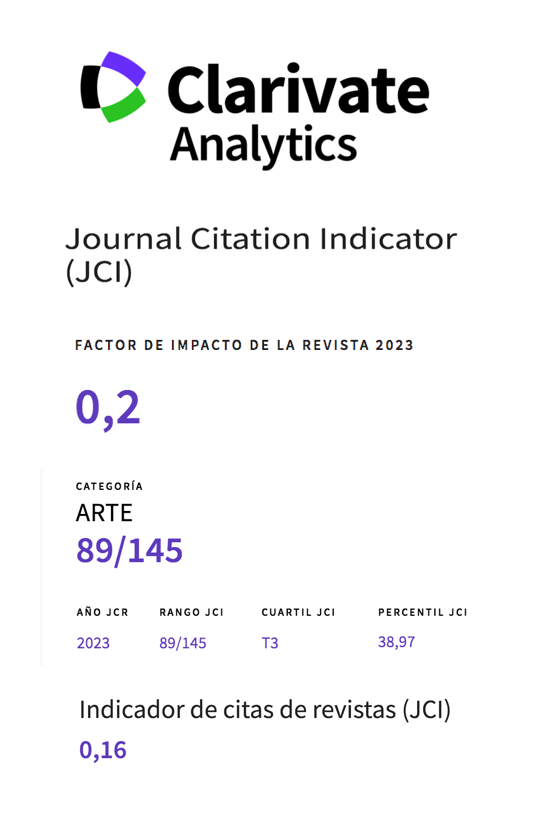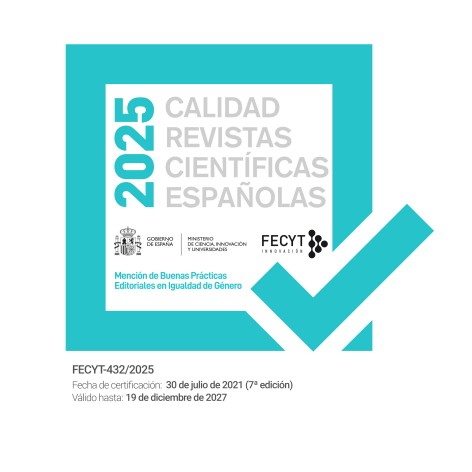Arte y máquinas.
Resumen
Este artículo explora la manera en que la ciencia y tecnología influyen sobre las artes a lo largo del siglo XX generando un interés por la ideas de indeterminación, aleatoriedad y autonomía. Estas ideas fueron exploradas inicialmente por unos pocos artistas y músicos para posteriormente generalizarse con la popularización de los ordenadores. El artículo también analiza las implicaciones que las obras generadas bajo estos parámetros tienen para conceptos como autoría, creatividad, original/copia.Descargas
-
Resumen479
-
PDF1001
Citas
Boden, M. y Edmonds, E. (2009). What is generative art?, Digital Creativity, 20, (1-2), 21-46. Recuperado el día 20/04/2013 de http://research.it.uts.edu.au/creative/eae/intart/pdfs/generative-art.pdf
Brown, A. (2012). Creative Partnerships with Technology: How creativity is enhanced through interactions with generative computational systems. AAAI Conference on Artificial Intelligence and Interactive Digital Entertainment. AAAI Publications Report WS, 12-16. Recuperado el día 14/12/2012 de http://www.aaai.org/ocs/index.php/AIIDE/AIIDE12/paper/view/5493
Brown, P. (2005). Is the Future of Music Generative?. Music Therapy Today (online) Vol. VI (2), 215-274. Recuperado el día 13/02/2013 de http://www.wfmt.info/Musictherapyworld/modules/mmmagazine/issues/20050411083630/20050411095852/MTT6_2_Brown2005.pdf
Carl, R. (2010). Terry Riley’s In C. Oxford: Oxford University Press.
Collins, N y Brown, A. R. (Ed.). (2009). Generative Music Editorial, Contemporary Music Review, 28(1), 1-4.
Diaz-Jerez, G. (2000). Algorithmic music: using mathematical models in music Composition (Tesis de maestría sin publicar, Manhattan School of Music). Recuperado el día 15/01/2012 de http://www.gustavodiazjerez.com/Gustavo_Diaz_Jerez_DMA_Thesis_MSM.pdf
Eigenfeldt, A. (2001). Towards a Generative Electronica: A Progress Report. eContact! 14.4 — TES 2001. Recuperado el día 10/04/2013 de http://cec.sonus.ca/econtact/14_4/eigenfeldt_generativeelectronica.html
------ (2013). The Human Fingerprint in Machine Generated Music. Proceedings of xCoAx2013: Computation, Communication, Aesthetics, and X. Bergamo, Italy. Recuperado el día 31/05/2013 de http://2013.xcoax.org/pdf/xcoax2013-eigenfeldt.pdf
Gilmore, J. y Fell, M. (2012). Composing with Process, Radio web MACBA. Recuperado el día 06/02/2013 de http://rwm.macba.cat/en/composingwithprocess_tag
Järveläinen, H. (2000). Algorithmic musical composition. HUT, Laboratory of Acoustics and Audio Signal Processing. Helsinki University of Technology. Recuperado el día 14/03/2013 de http://www.tml.tkk.fi/Studies/Tik-111.080/2000/papers/hanna/alco.pdf
Magnusson, T. (2002). Processor art: Currents in the Process Oriented Works of Generative and Software Art(Tesis de maestría sin publicar, University of Copenhagen, Dinamarca). Recuperado el día 12/02/2011 de http://ixi-audio.net/thor/pa_lowres.pdf
------ (in press). Generative Music: A Form without a Format. Leonardo Almanac. Magnusson, T y
Magnusson, R. (2007). SameSameButDifferent v.02-Iceland. YLEM Journal. Recuperado el día 13/04/2009 de http://www.ixi-audio.net/thor/SSBD_v02-Iceland.pdf
Maurer, J. (1999). A Brief History of Algorithmic Composition. Center for Computer Research in Music and Acoustics (CCRMA). Stanford University. Recuperado el 02/05/2013 de https://ccrma.stanford.edu/~blackrse/algorithm.html
Noguchi, H. (1997). Mozart - Musical Game in C K. 516f*. Recuperado el día 02/05/2013 de http://www.asahi-net.or.jp/~rb5h-ngc/e/k516f.htm
Roads, C. (1996). The Computer Music Tutorial. Cambridge: MIT Press.
Robert, C. (2010). Terry Riley’s In C. Oxford: Oxford University Press.
Selz, P. (1966). Directions in Kinetic Sculpture. Berkeley: University of California Press.
Ward, A. (1999). How I drew one of my pictures. Recuperado el día 11/04/2013 de http://generative.net/papers/autoshop/
Works published in this journal are subject to the following terms:
- The Service of Publications from the University of Murcia (publishing house) keeps the published works’ copyrights, and favors and allows the reuse of these works under the license indicated in point 2.
- Works are published in the journal’s online edition under the license Creative Commons Reconocimiento-NoComercial-SinObraDerivada 3.0 España(texto legal). They can be copied, used, disseminated, transmitted and publicly exhibited, as long as: i) the author and original source of publication are cited (journal, publishing house and work’s URL); ii) they are not used for commercial purposes; iii) the existence and specifications of this license are mentioned.
3. Conditions for auto-file. It is allowed and encouraged that authors share electronically their pre-print version (the pre-reviewed version) and /or post-print version (the reviewed and accepted version) of their Works before the publication, since it promotes its circulation and dissemination. RoMEO color: green.









